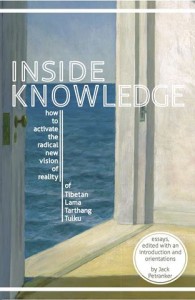Tottering between stressful agitation and energy-draining repetition, sometimes we feel like a spinning top and sometimes like a winter glove frozen in a snow bank. Anxiety and boredom carry a different charge, but they are really two faces of one problem: we are trying to drive our vehicle without first opening the door and climbing inside. Clinging to the rear bumper for dear life, how can we enjoy our trip though the countryside?
“Inside Knowledge” provides a friendly guide book for how to drive our lives from inside and thereby feel at home with both ourselves and the realm in which we live. A good start is to realize that our concerns, and the world in which we hope to satisfy them, are woven from the same cloth. The distances that we perceive separating us from our goals stem from a failure to recognize that we and our world arise together.
Readers who are already familiar with the TSK vision, through eleven earlier books (five works by Tarthang Tulku that introduce the vision and six TSK Perspective collections), will appreciate this first new contribution in a decade. I also believe that “Inside Knowledge”, while continuing to enrich the vision, has the power to attract readers who are new to it.
More than any of the previous books, “Inside Knowledge” offers a natural entry point for readers who might be intimidated by TSK’s sustained inquiry into the shortfalls and pain of how we conduct our lives. The contents include material from three sources: 1/ little-known essays by Tarthang Tulku, which explore the vision in dialogue with westerners, 2/ Jack Petranker’s orientations to the book as a whole and to each of the selected essays, and 3/ essays by students of the TSK vision which describe their personal experience of working with it.
What makes “Inside Knowledge” unique is that Jack Petranker, who has been primary editor for all but the first TSK book, is personally present in these pages more than he has previously been. He thereby models a path that the reader is inspired to follow: by exploring a new vision for living we find that our lives themselves can be transformed. Jack’s orientations serve to link these essays in both a personal and a global way. The overall result brings to light our indebtedness to a deeper kind of knowing, a more dynamic and living time, and a more open, allowing spaciousness than is visible in the flat-earth versions we and our society have accepted as real.
As in the epic poems of Homer and Virgil, we are embarking on a journey back home. But instead of storms and shipwrecks, we spar with our unquestioned answers to fundamental questions–not in order to find better answers but to open a window to infinite possibilities that have been hidden.
